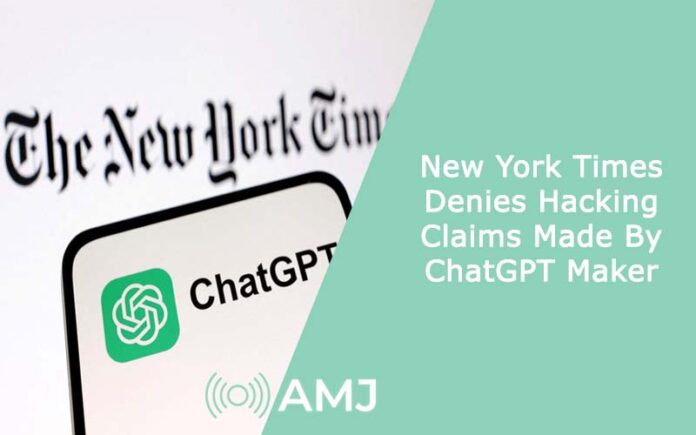In a recent development, The New York Times (NYT) has firmly denied claims made by OpenAI, the company that created ChatGPT, accusing the newspaper of hacking. The disagreement revolves around ChatGPT’s ability to get around paywalls and create content based on NYT articles. NYT had taken legal action against Microsoft and OpenAI for using its data without permission.
However, OpenAI countered these claims by accusing NYT of engaging in hacking activities to create false evidence for a copyright lawsuit. In response, NYT has rejected these claims in a court filing, stating that its actions were aimed at protecting its intellectual property, not hacking. The publication dismissed OpenAI’s claims as both false and irrelevant.
At the core of the dispute lies the behaviour of ChatGPT. OpenAI argued that NYT manipulated ChatGPT with deceptive queries, causing it to regurgitate memorized training data from over 100 NYT articles, exploiting flaws in the model’s training.
NYT, on the other hand, argued that ChatGPT has been widely used to bypass paywalls, allowing users to access NYT content without paying. The newspaper says its investigation was intended to gauge the extent of copyright infringement, not to initiate a lawsuit. By providing ChatGPT with excerpts from NYT articles, NYT sought evidence of unauthorized content use.
OpenAI’s claim that ordinary users wouldn’t use ChatGPT in this manner was met with doubt. NYT’s court filing suggests that OpenAI is upset because the investigation revealed the large-scale copying of NYT content by OpenAI, which OpenAI cannot dispute.
However, the recent filing lacks clarity on the number of its articles utilized in training GPT-3 and other AI models by OpenAI. The media giant stated that this information had not been disclosed publicly.
The New York Times is famous for prohibiting numerous AI companies that are growing from using its media data and archives from the internet to train large language models.
The dispute between The New York Times and OpenAI highlights the complex intersection of technology, intellectual property, and journalistic integrity. As AI capabilities continue to evolve, the need for clear boundaries and ethical guidelines becomes increasingly apparent.
The outcome of this clash will not only impact the involved parties but also set precedents for how similar conflicts are addressed in the future. Ultimately, finding a balance between innovation and respect for intellectual property rights will be crucial in navigating the ever-changing landscape of digital content creation and distribution.












![Index of Money Heist [Season 1, 2, 3 & 4 – All Episodes, Cast and Plot] Index of Money Heist](https://www.asiamediajournal.com/wp-content/uploads/2021/05/Index-of-Money-Heist-3-100x70.jpg)